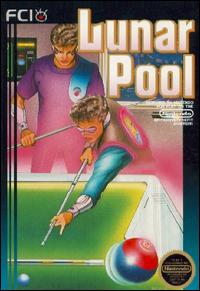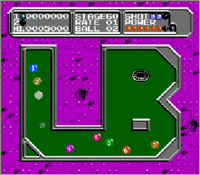Software:Lunar Pool
| Lunar Pool | |
|---|---|
 NES box cover | |
| Developer(s) | Compile |
| Publisher(s) | Pony Canyon (Japan) FCI (North America) |
| Composer(s) | Masatomo Miyamoto |
| Platform(s) | PC-8800 series, NES, MSX; re-release: Wii Virtual Console |
| Release | PC-88
|
| Genre(s) | Sports |
| Mode(s) | Single-player, multiplayer |
Lunar Pool (known as Lunar Ball (ルナーボール Runā Bōru) in Japan ) is a sports video game. It was developed in 1985 by Compile for the NEC PC-8000 series (in Japan), the Nintendo Entertainment System (NES, in Japan, North America, and Europe), and the MSX (in Japan), and re-released for the Wii on the North American Virtual Console on October 22, 2007. The game combines pool (pocket billiards) with aspects of miniature golf. The object is to use a cue ball to knock each object ball into one of the pockets on pool tables of various shapes. The game offers sixty levels, and the friction of the table is adjustable. Lunar Pool was distributed by Pony Canyon in Japan and Fujisankei Communications International in North America.
Gameplay
Lunar Pool is played on virtual pool tables of different shapes, some with obstacles within them. The player must shoot the cue ball to knock other colored object balls into the pockets. One life is lost whenever the player either fails to pocket an object ball on three consecutive shots or pockets the cue ball. Completing a level awards one extra life, or two if the player has pocketed at least one ball on every shot.

The value of each ball is determined by its number and the displayed "Rate" value, which starts at 1 and increases after every shot in which the player pockets at least one ball. Failing to do so resets the Rate to 1. Bonus points are awarded for completing a level without a miss.
The game ends after all lives are lost or 60 levels have been completed, whichever occurs first.
Modes
Lunar Pool can either be played alone, against another player, or against the computer. If the game is played against another player or the computer, players take turns shooting the cue ball. If one player fails to knock at least one of the colored balls into a pocket, or pockets the cue ball, then it becomes the opponent's turn.
The game includes an adjustable friction setting, which determines the rate at which balls slow down after being hit, as if affected by different amounts of gravity (thus the lunar reference in the title, along with Moon-related background imagery within the game).
Cultural references
In the Mexican soap opera María la del Barrio, José María (Roberto Blandón) plays Lunar Pool on the NES.[1]
References
- ↑ (in es) Tita confronta a María | María la del Barrio 2/4 | C-22 | tlnovelas, https://www.youtube.com/watch?v=XWR_qQYNciQ, retrieved March 4, 2023
External links
- MobyGames is a commercial database website that catalogs information on video games and the people and companies behind them via crowdsourcing. This includes over 300,000 games for hundreds of platforms.[1] Founded in 1999, ownership of the site has changed hands several times. It has been owned by Atari SA since 2022.
Features
Edits and submissions to the site (including screenshots, box art, developer information, game summaries, and more) go through a verification process of fact-checking by volunteer "approvers".[2] This lengthy approval process after submission can range from minutes to days or months.[3] The most commonly used sources are the video game's website, packaging, and credit screens. There is a published standard for game information and copy-editing.[4] A ranking system allows users to earn points for contributing accurate information.[5]
Registered users can rate and review games. Users can create private or public "have" and "want" lists, which can generate a list of games available for trade with other registered users. The site contains an integrated forum. Each listed game can have its own sub-forum.
History

MobyGames was founded on March 1, 1999, by Jim Leonard and Brian Hirt, and joined by David Berk 18 months later, the three of which had been friends since high school.[6][7] Leonard had the idea of sharing information about computer games with a larger audience. The database began with information about games for IBM PC compatibles, relying on the founders' personal collections. Eventually, the site was opened up to allow general users to contribute information.[5] In a 2003 interview, Berk emphasized MobyGames' dedication to taking video games more seriously than broader society and to preserving games for their important cultural influence.[5]
In mid-2010, MobyGames was purchased by GameFly for an undisclosed amount.[8] This was announced to the community post factum , and the site's interface was given an unpopular redesign.[7] A few major contributors left, refusing to do volunteer work for a commercial website.{{Citation needed|date=June 2025} On December 18, 2013, MobyGames was acquired by Jeremiah Freyholtz, owner of Blue Flame Labs (a San Francisco-based game and web development company) and VGBoxArt (a site for fan-made video game box art).[9] Blue Flame Labs reverted MobyGames' interface to its pre-overhaul look and feel,[10] and for the next eight years, the site was run by Freyholtz and Independent Games Festival organizer Simon Carless.[7]
On November 24, 2021, Atari SA announced a potential deal with Blue Flame Labs to purchase MobyGames for $1.5 million.[11] The purchase was completed on 8 March 2022, with Freyholtz remaining as general manager.[12][13][14] Over the next year, the financial boost given by Atari led to a rework of the site being built from scratch with a new backend codebase, as well as updates improving the mobile and desktop user interface.[1] This was accomplished by investing in full-time development of the site instead of its previously part-time development.[15]
In 2024, MobyGames began offering a paid "Pro" membership option for the site to generate additional revenue.[16] Previously, the site had generated income exclusively through banner ads and (from March 2014 onward) a small number of patrons via the Patreon website.[17]
See also
- IGDB – game database used by Twitch for its search and discovery functions
References
- ↑ 1.0 1.1 Sheehan, Gavin (2023-02-22). "Atari Relaunches The Fully Rebuilt & Optimized MobyGames Website". https://bleedingcool.com/games/atari-relaunches-the-fully-rebuilt-optimized-mobygames-website/.
- ↑ Litchfield, Ted (2021-11-26). "Zombie company Atari to devour MobyGames". https://www.pcgamer.com/zombie-company-atari-to-devour-mobygames/.
- ↑ "MobyGames FAQ: Emails Answered § When will my submission be approved?". Blue Flame Labs. 30 March 2014. http://www.mobygames.com/info/faq7#g1.
- ↑ "The MobyGames Standards and Practices". Blue Flame Labs. 6 January 2016. http://www.mobygames.com/info/standards.
- ↑ 5.0 5.1 5.2 Miller, Stanley A. (2003-04-22). "People's choice awards honor favorite Web sites". Milwaukee Journal Sentinel.
- ↑ "20 Years of MobyGames" (in en). 2019-02-28. https://trixter.oldskool.org/2019/02/28/20-years-of-mobygames/.
- ↑ 7.0 7.1 7.2 Plunkett, Luke (2022-03-10). "Atari Buys MobyGames For $1.5 Million". https://kotaku.com/mobygames-retro-credits-database-imdb-atari-freyholtz-b-1848638521.
- ↑ "Report: MobyGames Acquired By GameFly Media". Gamasutra. 2011-02-07. https://www.gamedeveloper.com/game-platforms/report-mobygames-acquired-by-gamefly-media.
- ↑ Corriea, Alexa Ray (December 31, 2013). "MobyGames purchased from GameFly, improvements planned". http://www.polygon.com/2013/12/31/5261414/mobygames-purchased-from-gamefly-improvements-planned.
- ↑ Wawro, Alex (31 December 2013). "Game dev database MobyGames getting some TLC under new owner". Gamasutra. https://www.gamedeveloper.com/business/game-dev-database-mobygames-getting-some-tlc-under-new-owner.
- ↑ "Atari invests in Anstream, may buy MobyGames". November 24, 2021. https://www.gamesindustry.biz/articles/2021-11-24-atari-invests-in-anstream-may-buy-mobygames.
- ↑ Rousseau, Jeffrey (2022-03-09). "Atari purchases Moby Games". https://www.gamesindustry.biz/atari-purchases-moby-games.
- ↑ "Atari Completes MobyGames Acquisition, Details Plans for the Site's Continued Support". March 8, 2022. https://www.atari.com/atari-completes-mobygames-acquisition-details-plans-for-the-sites-continued-support/.
- ↑ "Atari has acquired game database MobyGames for $1.5 million" (in en-GB). 2022-03-09. https://www.videogameschronicle.com/news/atari-has-acquired-game-database-mobygames-for-1-5-million/.
- ↑ Stanton, Rich (2022-03-10). "Atari buys videogame database MobyGames for $1.5 million". https://www.pcgamer.com/atari-buys-videogame-database-mobygames-for-dollar15-million/.
- ↑ Harris, John (2024-03-09). "MobyGames Offering “Pro” Membership". https://setsideb.com/mobygames-offering-pro-membership/.
- ↑ "MobyGames on Patreon". http://www.patreon.com/mobygames.
Wikidata has the property:
|
External links
- No URL found. Please specify a URL here or add one to Wikidata.
 |
 |
